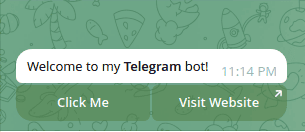Send Text Message in Telegram Bot
Text messages are one of the first and easiest ways to intract with a user.
To create and send text messages to users in the bot or Telegram channels, we use the Message class, which allows for message customization
Basic Usage : Simple example of sending a message
use Botfire\Models\Message;
Message::create('Hello From Telegram Bot')
->chatId('1234567')
->send();This sends the message "Hello From Telegram Bot" to the user who initiated the interaction.
For simple scenarios, you can send a text message directly to the current user (the one who triggered the bot) without specifying a chat_id. The BotFire library automatically sets the chat_id to the current client's ID if not provided.
Message::create('Hello From Telegram Bot')->send();Advanced Usage with Message Class
For more control over the message, use the Message class to configure additional properties such as chat ID, parse mode, inline keyboards, and more.
Configuring Messages with the Message Class
The Message class offers a fluent, chainable interface to customize properties of a message. This allows developers to fine-tune aspects like recipient targeting, text formatting, notifications, and interactive elements. Below is a detailed breakdown of the available configuration methods.
Available Configuration Methods
| Method Name | Description |
|---|---|
businessConnectionId($id) | Specifies the unique identifier for a business connection on whose behalf the message is sent. |
chatId($chat_id) | Defines the target chat or channel for the message. Use a numeric chat ID or a channel username (e.g., @channelusername). |
messageThreadId($id) | Targets a specific message thread (topic) in forum supergroups. |
parseMode($mode) | Controls how the message text is formatted. Supported modes are HTML, Markdown, or MarkdownV2. Refer to the Formatting Options section for details. |
entities($entities) | Allows manual specification of special entities (e.g., bold, italic, links) in the message text using a JSON-serialized array. Use this instead of parseMode for granular control. |
linkPreviewOptions($options) | Customizes how link previews are displayed in the message (e.g., enabling/disabling previews or setting preview size). |
disableNotification($bool) | Sends the message silently, without triggering a notification sound on the recipient’s device. |
protectContent($bool) | Prevents the message content from being forwarded or saved by recipients. |
allowPaidBroadcast($bool) | Enables sending up to 1000 messages per second, bypassing broadcast limits, for a fee of 0.1 Telegram Stars per message. |
messageEffectId($id) | Adds a visual effect to the message (available in private chats only). |
replyParameters($params) | Specifies details for replying to a specific message (e.g., quoting a message). |
replyMarkup($markup) | Attaches an interactive keyboard (inline or reply) to the message for user interaction. See the Keyboards section for more details. |
Usage Example
Here’s an example combining multiple configuration methods for a richly formatted message:
use Botfire\Bot;
use Botfire\Helper\ParseMode;
use Botfire\Keyboard\InlineButton;
use Botfire\Keyboard\InlineKeyboard;
use Botfire\Models\Message;
$message = Message::create('Welcome to my **Telegram** bot!')
->chatId(123456789)
->parseMode(ParseMode::MarkdownV2)
->disableNotification(true)
->replyMarkup(
(new InlineKeyboard())->row([
InlineButton::button('Click Me', 'action_click'),
InlineButton::link('Visit Website', 'https://example.com'),
])
);
$message->send();This configuration sends a Markdown-formatted message to a specific chat, without a notification sound, and includes an inline keyboard with two buttons.
TIP
Chain methods fluently to create concise and readable code. For example :$message->chatId(123)->parseMode(ParseMode::HTML)->disableNotification(true);
Formatting Options
The parseMode method allows you to format message text using one of three modes: HTML, Markdown, or MarkdownV2. For convenience, the ParseMode class provides constants for these values.
use Botfire\Bot;
use Botfire\Helper\ParseMode;
use Botfire\Models\Message;
Message::create('Hello, this is a *test* message!')
->chatId(12345678);
->parseMode(ParseMode::MarkdownV2)
->send();Available Parse Modes:
ParseMode::HTML: Formats text using HTML tags.ParseMode::Markdown: Formats text using Markdown syntax (legacy).ParseMode::MarkdownV2: Formats text using the updated MarkdownV2 syntax.
TIP
For advanced MarkdownV2 formatting, BotFire provides a Markdown builder. Refer to the Markdown Builder Documentation for details on constructing formatted text programmatically.
Adding Keyboards
You can enhance messages with interactive keyboards using the replyMarkup method. BotFire supports both InlineKeyboard and ReplyKeyboard for creating custom interfaces.
use Botfire\Bot;
use Botfire\Keyboard\InlineButton;
use Botfire\Keyboard\InlineKeyboard;
use Botfire\Models\Message;
$keyboard = new InlineKeyboard();
$keyboard->row([
InlineButton::button('Click Me', 'callback data'),
InlineButton::link('Open Google', 'https://www.google.com'),
]);
$message = Message::create('Hello, this is a *test* message!');
$message->chatId(12345678);
$message->replyMarkup($keyboard);
Bot::sendMessage($message);TIP
For more details on creating and customizing keyboards, refer to the Keyboards Documentation.
Sending a Formatted Message with an Inline Keyboard
use Botfire\Bot;
use Botfire\Helper\ParseMode;
use Botfire\Keyboard\InlineButton;
use Botfire\Keyboard\InlineKeyboard;
use Botfire\Models\Message;
$keyboard = new InlineKeyboard();
$keyboard->row([
InlineButton::button('Click Me', 'action_click'),
InlineButton::link('Visit Website', 'https://example.com'),
]);
$message = Message::create('Welcome to my *Telegram* bot!');
$message->chatId(12345678);
$message->parseMode(ParseMode::MarkdownV2);
$message->replyMarkup($keyboard);
$message->send();Result in bot: 
Notes
- If
chat_idis not specified, the library automatically uses the ID of the user who triggered the bot. - Ensure your bot has the necessary permissions to send messages to the specified chat or channel.